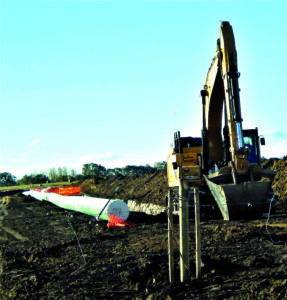Court reversal lets DAPL oil flow

Pipeline construction shown along the Missouri River breaks in 2016: “We look forward to showing why the Dakota Access Pipeline is too dangerous to operate,” Standing Rock Sioux Tribal Chair Mike Faith said in 2020. Photo by Talli Nauman
WASHINGTON, D.C. – On Aug. 5, a three-judge panel here reversed lower court orders so that oil may continue to flow through the Dakota Access Pipeline while hearings proceed on an appeal of a ruling to withdraw DAPL’s permit to cross the Missouri River just upstream from the Standing Rock Sioux Tribe’s drinking water intake.
In March, a district judge invalidated the permit issued to pipeline builder Energy Transfer Partners and associates four years ago by the U.S. Army Corps of Engineers because it violated the National Environmental Policy Act by failing to carefully consider the dangers posed to the Standing Rock Sioux Tribe. In July, he ordered the oil flow shut off.
In the reversal on the same day the oil flow was supposed to cease, the panel, seated at the U.S. District of Columbia Circuit Court of Appeals, also ruled to let stand that lower court’s order to withdraw the permit pending an environmental review, effectively creating a situation in which the pipeline is operating illegally.
Standing Rock Sioux Tribal Chair Mike Faith hailed the decision as a milestone on tribes’ long crusade against the pipeline route through unceded treaty territory. “As the environmental review process gets underway in the months ahead, we look forward to showing why the Dakota Access Pipeline is too dangerous to operate,” he said.
Earthjustice attorney Jan Hasselman, one of many lawyers for the Standing Rock, Cheyenne River, Yankton, and Oglala Sioux tribes in the pipeline battle, explained, “The pipeline is now operating illegally.” But, he said, “We are confident that it will be shut down eventually.”
It falls to the U.S. Army Corps of Engineers, which issued the now-invalid permit, to decide whether to exercise its authority to shut down the pipeline. The issue will go back to the lower court for more proceedings on that count if the Corps doesn’t.
U.S. President Donald Trump has ordered the agency to do everything in its power to facilitate the pipeline.
The Corps’ appeal of the permit withdrawal will continue in the Circuit Court, with all briefs to be filed by the end of September, according to the judges’ instructions.
However, this latest court decision stipulated that the appeal to nix the permit withdrawal is not likely to prevail on its merits. A final decision on whether to re-issue the permit for the Dakota Access Pipeline also is not likely until after the 2020 Presidential election, which sets up the possibility of permanent closure, Earthjustice said.
“Dakota Access is an affront to tribal sovereignty and a threat to public health and clean water,” Hasselman said. “Everyone would be safer if operations were halted.”
Faith added, “We’ve been in this legal battle for four years, and we aren’t giving up this fight.”
When tribes and allies came together in 2016 to halt pipeline construction, the DAPL conflict “sparked an ongoing conversation about indigenous rights and the federal government’s longstanding pattern of steamrolling ahead with dangerous fossil fuel projects while ignoring tribal concerns,” Earthjustice said.
An oil spill would poison the tribe’s drinking water and the water supply for some 17 million people downriver.
The district judge has ordered the Corps to prepare an environmental impact statement, as requested by the Standing Rock Sioux Tribe since the beginning of the permit application process.
